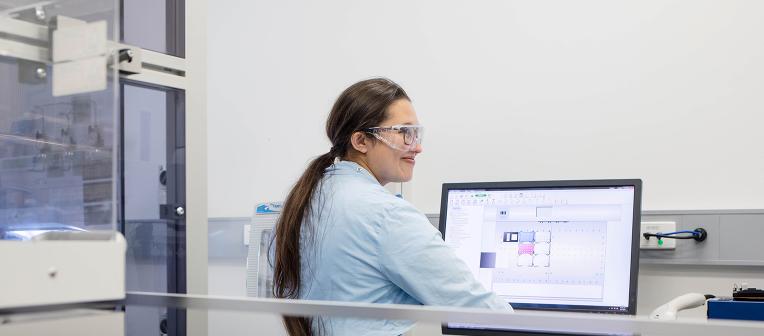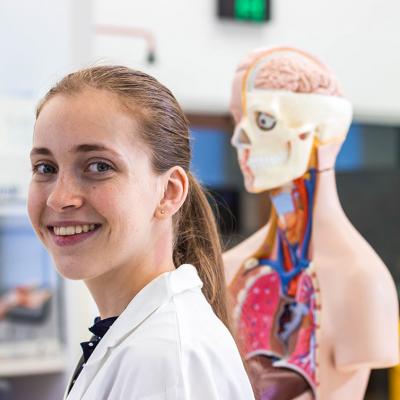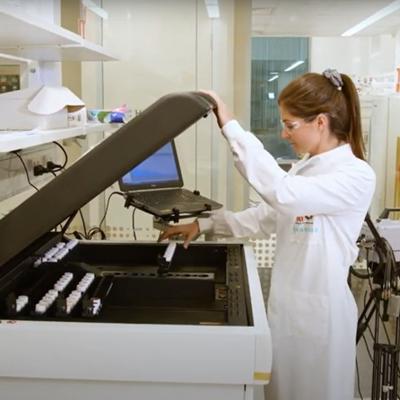Looking for the best place to study biomedical science? We might be a little biased, but we’d suggest beginning your learning journey at UQ, and here’s why.
Join an inclusive biomedical community where students, academics, researchers, clinicians, alumni and industry come together to foster learning.
Read on to discover the benefits of studying biomedical science at UQ.
Learn from the best
Engage with award-winning lecturers with a wealth of experience teaching students across UQ’s science, health and medical programs. At UQ, teaching is based on the latest research developments to make sure you graduate with world-class skills, knowledge and understanding.
Senior Lecturer Dr Taylor Dick is a UQ biomedical science teacher who is also a researcher. She specialises in neuromuscular biomechanics, which is the study of muscles and tendons and how the brain tells us to move them. Taylor is passionate about sharing her latest research with her undergraduate students.
Taylor has worked on several fascinating research projects. Recently, she’s analysed kangaroo Achilles tendons with computer simulation technology to determine whether short-faced, giant kangaroos that roamed Australia 40,000 years ago could indeed hop.
As a biomedical sciences student at UQ, you’ll learn about the latest research your teachers are conducting – before it’s even published. And, even better, you’ll have the opportunity to work on it too.
“I run mini research symposiums in a few of my courses to engage my undergraduate students in research and showcase the different pathways into research,” says Taylor.
This often inspires third year students to delve deeper into research and pursue honours projects in Taylor’s Neuromuscular Biomechanics Lab.
Get hands-on experience
Gain extensive experience in practical laboratories where the latest breakthroughs in medical sciences are taking place. While studying biomedical science at UQ, you’re encouraged to join labs to delve into specific topics of interest.
Current biomedical science student Josh Griffiths speaks highly of the hands-on experiences he’s been involved in throughout his studies. Josh worked in one of his teacher’s labs to gain exposure to areas of biomedical science that have sparked his curiosity.
“The Motor Control and Pain Lab was very interesting,” he says.
“It’s research that’s going into clinical medicine, so you could really see the application of what you want to do.”
Be involved in the latest research
At UQ, opportunities to get involved in research aren’t exclusively for postgrad students and PhD candidates. As an undergrad biomedical science student, you can develop new skills, enhance your employability, learn from outstanding researchers and explore what a career in research might be like by participating in research projects.
UQ’s School of Biomedical Sciences offers Summer or Winter Research Programs, where undergraduate students can gain up to 30 days of research experience in the uni holidays. If you apply and get accepted into the program, you’ll receive a grant to help fund the experience.
Previous Summer or Winter Research Programs undertaken by biomedical science students have covered fascinating topics in:
- histology
- MRI imaging
- epilepsy
- neuromuscular function
- neurodegenerative diseases
- novel nano-approaches for cancer treatment.
You’ll also have the option to undertake a small research project in your third year of study.
Find out more about undergraduate research opportunities for biomedical science students at UQ.

Study in state-of-the-art facilities
Our cutting-edge teaching laboratories are equipped with over $15 million worth of research infrastructure. You’ll learn in UQ’s Gross Anatomy Facility, one of Australia’s leading scientific, training and research facilities for anatomy. You’ll also have access to the Integrated Pathology Learning Centre (IPLC), which houses over 5,000 human pathology specimens to help you better understand disease.
Josh believes there are clear benefits to choosing UQ for your biomedical science degree over other universities, and one of the main drawcards is the facilities.
“My highlights have been being able to use the anatomy facilities and the anatomical model in the library.”
Gain a global perspective
Head on a once-in-a-lifetime study exchange experience with one of our prestigious international partner universities. You could join fellow biomedical science students at Oxford University in the UK or Ludwig Maximilian University (LMU) in Germany.
Unsure if you’re ready to commit to an entire exchange semester? There are plenty of short-term global experiences on offer too.
Is UQ the best university to study biomedical science at? We’ll leave that up to you to decide, though we think we’ve made some pretty compelling arguments.
Explore UQ’s Bachelor of Biomedical Science to discover more reasons it should be your first QTAC preference.







